The eleventh century brought great changes in the political landscape of the peninsula. The dissolution of the Caliphate led to the subsequent rise of many small kings, known as “taifas”. The Taifas’ kingdoms were rich from taxes that they had not channelled to Cordoba, but were weak militarily, and yielded to the pressure of the early Christian kingdoms, who imposed heavy taxes and threatened them with periodic military raids. It was under these circumstances that el Cid (from the Arabic sayyid, or “sir”), a seasoned knight from Burgos, took control of the Valencian territory, conquering the capital in 1094.
The five scenes evoke, in the form of a flashback, the most notable events from the taifa of Balansiya.
-
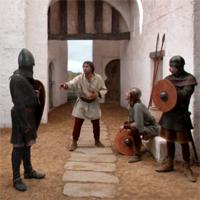 The soldiers of El Cid
The soldiers of El CidAfter several disagreements with the king of Castile, towards 1088 the Cid began acting as an independent leader, controlling the entire Levant. He plundered the Taifa of Denia, defeated the allied troops of the Count of Barcelona and Lleida in Tévar emir, and in June 1094 took Madinat Balansiya, defeating in the Almoravid army Quart who had come to his aid. From here I try to lay the foundations of an unstable state sustained by arms, seeking the support of the bishop of Toledo to legitimize his personal crusade.
-
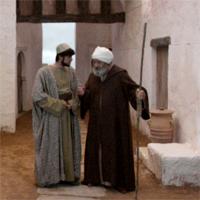 The siege of Balansiya
The siege of BalansiyaIn the autumn of 1093 el Cid and his army surrounded Madinat Balansiya, destroying the outskirts to force the surrender of the city. Madinat Balansiya capitulated nine months later, after a devastating siege. The soldiers besieging the city did not even permit the burial of the dead in cemeteries outside the walls, as was the custom. The people of Madinat Balasiya were forced to dig graves in the streets and plazas to bury those who had died. These atrocious events that occurred behind the walls of the medina were chronicled in the poem “Elegy of Valencia” by Abu-l-Walid al-Waqqasi.
-
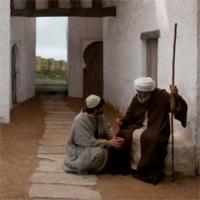 Apogee of the Taifa kingdoms
Apogee of the Taifa kingdomsAfter the dissolution of the Caliphate, the kingdoms of the taifas that rose in al-Andalus created a palace court in imitation of the court in Córdoba, attracting writers, jurists, clerks, officials, and above all, artisans. The first decades were prosperous and permitted, for example, the erection of the splendid wall of Balansiya, built by the emir Abd al-Aziz (1021-1061). However, the opulence of the small states quickly attracted the greed of the Christan kingdoms. Fernando I, king of Castilla and León, attacked the city in 1065, feigned a retreat, and massacred the reckless defenses that pursued him. This was the first of many other assaults that happened in the following decades.
-
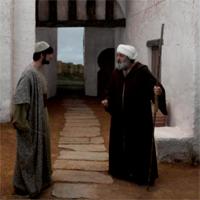 Taxes
TaxesBeginning in the year 1065, the taifa of Valencia had difficulties maintaining its autonomy in the face of the more powerful taifas of Zaragosa and, especially, Toledo. Additionally, the taifa continued to pay heavy taxes to the Christian states, which they settled by coining illegitimate money. In 1085, the king of Toledo, al-Qadir, surrendered his throne to Alfonso VI of Castille in exchange for his promise of the taifa of Valencia. Al-Qadir occupied Madinat Balansiya the following year, despite the open hostility of its inhabitants. His rule was maintained by Castillian troops commanded by Alvar Fáñez, which were sustained by imposing new taxes on the population. In this same year, the Almoravids came to the Peninsula, occupying one by one the different taifas and slowing the Christian advance.
-
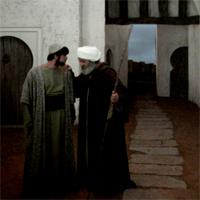 Ibn Yahhaf and the Almoravids
Ibn Yahhaf and the AlmoravidsRoused by the Almoravid victories, and knowing that the Júcar was already penniless, in the summer of 1092 the Valencians revolted against al-Qadir, killing him. The people entrusted power to the cadi Ibn Yahhaf, a member of an illustrious local lineage. El Cid appeared almost immediately before Madinat Balansiya, demanding the city's submission. The oligarchy was split into factions, some supporting those who has resisted since the arrival of the Almoravids, and others in agreement with the Castillians. These divisions left Madinat Balansiya in an unstable status quo. El Cid conquered the city in June of 1094 and immediately arrested and burned Ibn Yahhaf alive in retaliation.
